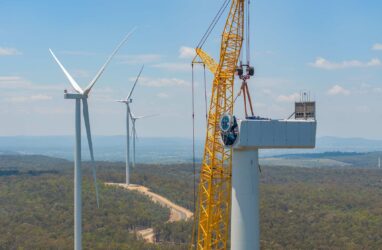Around The Web
World nears dangerous tipping points as wildlife populations collapse, WWF says
Euro Markets: Midday Update
Commonwealth states to launch first-ever joint ocean declaration at upcoming Samoa meeting
Multi-donor initiative pledges $2.5 bln to help Cameroon halt deforestation
Exchange sets out to create ASEAN regional carbon market framework
PREVIEW: High expectations that COP16 can boost demand for biodiversity credits
2040 climate target, role of nuclear on the agenda at EU meeting on COP29
Japanese offset developer secures local partners for expansion in Thailand
African nature credit buyer’s club to launch with target of ‘millions of dollars’
ANALYSIS: Australia’s environmental credibility contrasts good intentions, summit delegates say
Collapsing wildlife populations near ‘points of no return’, report warns
As average population falls reach 95% in some regions, experts call for urgent action but insist ‘nature can recover’
Global wildlife populations have plunged by an average of 73% in 50 years, a new scientific assessment has found, as humans continue to push ecosystems to the brink of collapse.
Latin America and the Caribbean recorded the steepest average declines in recorded wildlife populations, with a 95% fall, according to the WWF and the Zoological Society of London’s (ZSL) biennial Living Planet report. They were followed by Africa with 76%, and Asia and the Pacific at 60%. Europe and North America recorded comparatively lower falls of 35% and 39% respectively since 1970.
Continue reading...Korean trade ministry proposes sub-rules for CCUS project development
Herd of tauros to be released into Highlands to recreate aurochs effect
Large, cattle-like tauros will shape landscape and strengthen wildlife as huge, extinct herbivore once did
A herd of beefy, long-horned tauros are to be released into a Highlands rewilding project to replicate the ecological role of the aurochs, an extinct, huge herbivore that is the wild ancestor of cattle.
The tauros have been bred in the Netherlands in recent years to fill the niche vacated by the aurochs, which once shaped landscapes and strengthened wildlife across Europe.
Continue reading...Global shift to renewables has quickened, but still not fast enough to meet crucial climate goals
The post Global shift to renewables has quickened, but still not fast enough to meet crucial climate goals appeared first on RenewEconomy.
Labor springs surprise nuclear power committee to call Coalition bluff on energy policy
The post Labor springs surprise nuclear power committee to call Coalition bluff on energy policy appeared first on RenewEconomy.
Gold Standard seeks carbon project developers to pilot new digital MRV tool
ARB boosts bi-weekly offset issuance by 73%, yet trails 2023 YtD
Canada announces plans to advance mandatory emissions disclosures
Permit delays among the biggest bottlenecks for US CCS projects
On the climate crisis, housing and more, politicians avoid clarity because it demands action | Greg Jericho
Our leaders may prefer complexity because it means they can defer taking action – but doing something about emissions reduction or slow wage growth is actually not that complex
After spending any time analysing policy you quickly realise that politicians expend a supreme level of effort to avoid doing the obvious, and instead they do complex things that neither solve a problem nor appease their opponents.
For politicians, the problem with clarity is that it demands action. Complexity provides safety because action can more easily be avoided. And so the obvious and clear are painted as “extreme”, while the complex is regarded as “mature”.
Sign up for Guardian Australia’s breaking news email
Continue reading...




